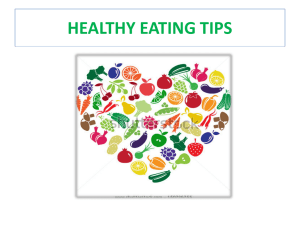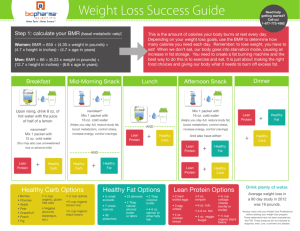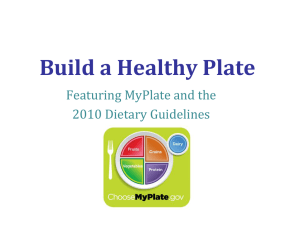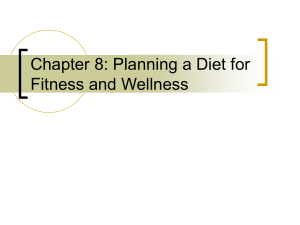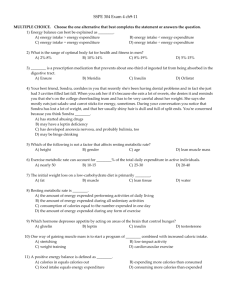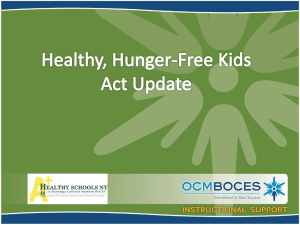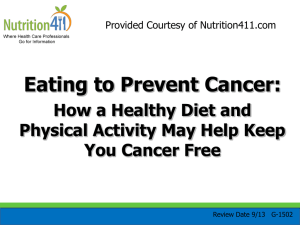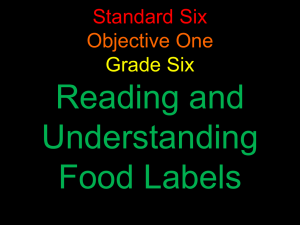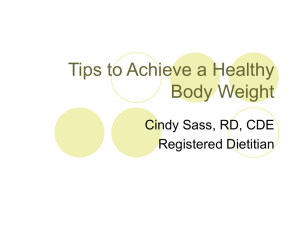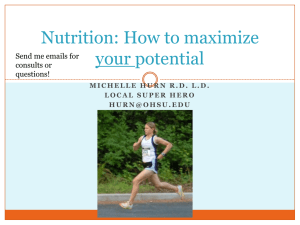Sports Nutrition: Enhancing Athletic Performance
advertisement
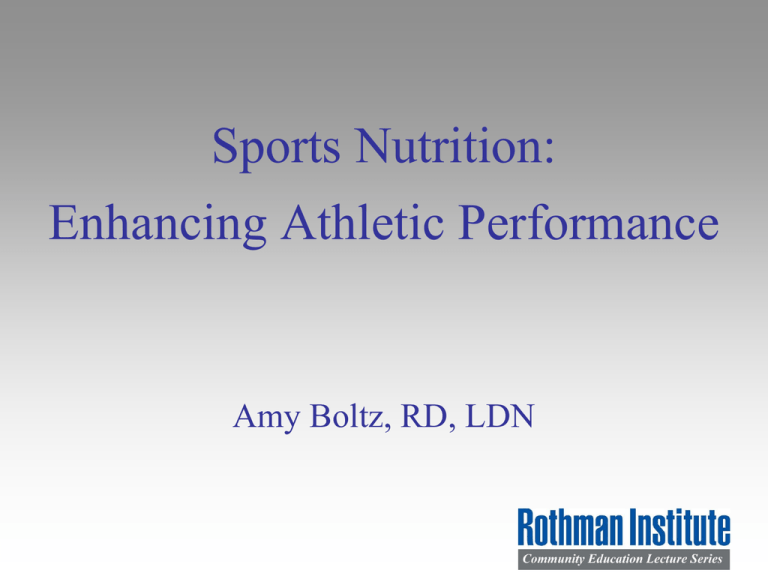
Sports Nutrition: Enhancing Athletic Performance Amy Boltz, RD, LDN What You Will Learn • Nutrition Basics • How nutrition can affect athletic performance • What type of diet you should be on during the training season • What you should eat before, during and after competition • How to maintain proper hydration Why is Nutrition Important? • Good nutrition is essential to: – – – – – – Preserve and build muscle Maintain healthy bones Maximize oxygen transport and use Repair existing cells and create new tissue Maintain optimal fluid and electrolyte balance Provide energy Nutrition Can Significantly Improve Athletic Performance What is important? Healthy Food Choices Adequate Fueling Hydration Understanding supplements What is the Best Diet for Athletes? • A well balanced diet that includes variety ~30% ~55% Carbohydrates Protein ~15% Fat The Food Guide Pyramid Fats & Sweets: sparingly Dairy: 2-3 Vegetables: 3-5 Meat: 2-3 Fruits: 2-4 Grains: 6-11 Following the Food Guide Pyramid will help achieve a well balanced diet Energy…What is it and Where does it come from? • Energy is the ability to perform work • Energy comes from food and is measured in calories • Calories come from: • Carbohydrate • Protein • Fat The Best fuel for our muscles is Carbohydrates!! High carb foods are grains, fruits, vegetables, dairy, and beans Carbohydrates • Stored as glycogen in the muscles – Preferred/ Major source of energy – Broken down rapidly – Important in maximal exercise • Carbohydrates also: – – – – Power muscle contraction Provide fuel for the brain Aids in fat metabolism Protein sparing effect • Allows protein to be used for tissue maintainence/repair verses energy Training Diet Eat a high carb diet of 275-350 grams/day Food Grams of Carb 1/2 cup pasta 1 slice of bread Large baked potato Banana 1 cup low-fat milk 1 cup of most beans 20 13 30-50 27 12 40-45 Above Numbers are based on a 2,000 calorie diet. What happens when Carbohydrate intakes are low? • • • • • Decreased athletic performance Muscle loss (protein used for energy) Fatigue Nutrient deficiency Irritability What about Protein? • Role in the body – – – – Tissue maintenance Tissue repair Tissue growth Energy source (to a lesser degree) How much Protein Do I need? • Most athletes in heavy training need 1.0-1.8 grams per kiligram body weight. Protein needs = ( Weight in pounds ) X 1.3 2.2 Body weight 100 lb 120 lb 140 lb 160 lb 180 lb Protein gram/day 59 g 71 g 83 g 95 g 106 g How can I meet my protein needs? • Food is the best source of protein • High protein foods include: – – – – Meats Dairy products Nuts Beans • Most Americans eat more than the recommended amount of protein – Protein supplements are not necessary How much protein is in my food? Food 4 oz chicken or steak Grams of Protein 33 g 1 large hamburger 22 g 1 cup mixed nuts 23 g 2 eggs 12 g 2 Tbsp peanut butter 8g 1 cup milk 8g 1 slice of cheese 7g Pre-Competition Meals Goal: To provide adequate carbohydrate energy and optimal hydration Eat to Compete It takes 1- 4 hours for food to leave your stomach High Carb foods are digested quickly High Protein foods can increase water requirements Foods high in Fat can stay in your stomach for more than 4 hours Best choice for pre-game meals is something high in Carbs - easy to digest and becomes quick energy ! Pre-Competition Meals Time before exercise Calories needed per pound of weight 1 hour 2 hours 2 4 3 hours 6 4 hours 8 You have 3 so… 6 hours times Your weight (pounds) # of calories you need to eat before practice X ______ lbs = _____ cal. 140 lbs = 840 calories Good Choices when you need a quick bite on the road • Burger Joint: – Single burger or grilled chicken, small fries and milk – Baked potato with chili and frozen yogurt • Convenience store: – Turkey and cheese hoagie and a piece of fruit • Pizza Place: – 2 slices of thin pizza with a veggie topping – Side salad with breadsticks and marinara sauce • Mexican place: – Bean burrito and low fat chips and salsa I am always on the road. What should I pack? • • • • • • Whole grain bagels Peanut butter crackers Fresh or dried fruit Trail mix String Cheese Veggies with low fat dressing • Dry Cereals • Granola/ Energy Bars • Pudding or Yogurt • Nuts and seeds • Peanut butter and Jelly Sandwich • Pretzels/ Baked Chips • Sports drinks • Juice Boxes What and When should I eat after I Workout? • In the first 30 minutes: – Replace fluids and electrolytes – Eat high-carbohydrate foods • Examples: Banana, Yogurt, Granola Bar • Within 2 hours: – Drink 2-3 cups of fluid for every pound lost – Eat a high-carbohydrate meal with some protein • Example: Ham Sandwich, Rice and Beans Proper Hydration Hydration The best way to stay well hydrated for exercise is to drink • Before • During • After Remember! Drink regardless of whether you are thirsty or not! How much do I drink and when ??? Way Before Right Before Drink 2-3 cups of fluid 2 to 3 hours before playing Drink 1 cup of fluid 10 to 30 minutes before playing During After Drink 1 cup Drink at least of fluid every 2 cups for 15 minutes every pound of lost weight Every 15 minutes For every pound of lost weight How will I know if I am becoming dehydrated? • Warning Signs: – – – – – – – Headache Fatigue Confusion Nausea Muscle Cramps Dizziness Decreased stamina, speed, energy, muscle strength Which Beverage is Best? Iced Tea ? Soda ? 100% Juice ? Water ? Sports Drinks ? Milk ? Supplements: Helpful or Harmful? • Supplements can be dangerous • No one know exactly what many supplements do • High intakes can be extremely dangerous • There is a lack of research on their effectiveness • They can be expensive A Better Alternative to Supplements • Train hard • Eat enough to support your training – – – – Eat an extra 500-1,000 calories per day Eat a variety of foods from all food groups Eat several small meals and snacks every day Remember Carbs are most important • Natural foods are best! True or False • Athletes need supplements to meet their protein needs – False • Although protein promotes muscle growth and recovery from strength training, carbohydrate is more important for building muscle strength – True • Carbohydrates always turn into fat – False Questions?
